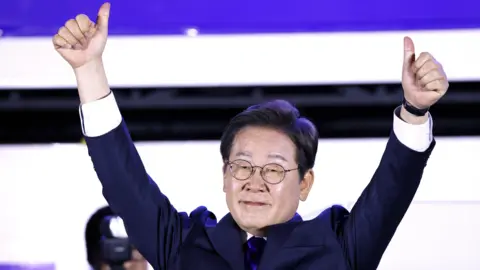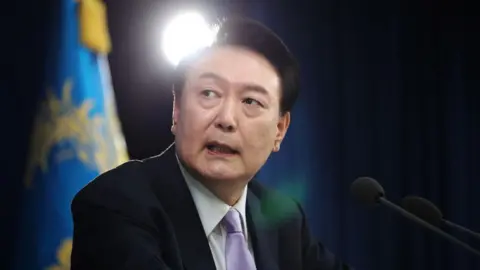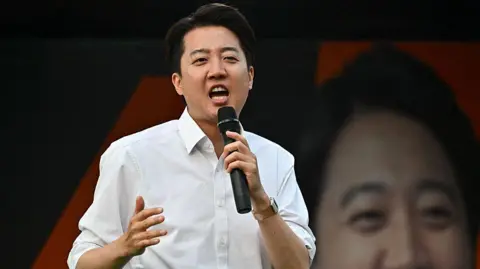Editor, BBC Korean
 EPA-EFE
EPA-EFESouth Korea has handed a decisive victory to opposition candidate Lee Jae-myung six months after his predecessor’s martial law bid failed.
The brief yet disastrous move set off huge protests and ended former president Yoon Suk Yeol’s career: impeached and removed from office, he still faces criminal charges for abusing his power.
But the political chaos that followed means victorious Lee’s biggest challenge is still ahead of him. He must unite a polarised country that is still reeling from it all.
He also faces challenges abroad – crucially, negotiating a trade deal with US President Donald Trump to soften the blow of tariffs from South Korea’s closest ally.
His main rival was the ruling party candidate and a former member of Yoon’s cabinet, Kim Moon-soo.
He had been trailing Lee for weeks in polls and in the early hours of Wednesday, he conceded defeat, congratulating Lee “on his victory”.
In an earlier speech, Lee had hinted at the win but stopped short of declaring it. He said “recovering” South Korea’s democracy would be his first priority.
The snap election comes just three years after the 61-year-old lost his last presidential bid by a razor-thin margin to Yoon.
It’s a remarkable comeback for a man who has been caught in several political scandals, from investigations over alleged corruption to family feuds.
Analysts say Lee’s win is also a rejection of the ruling People Power Party (PPP), which was tarred by Yoon’s martial law order.
“Voters weren’t necessarily expressing strong support for Lee’s agenda, rather they were responding to what they saw as a breakdown of democracy,” Park Sung-min, president of Min Consulting, told the BBC.
“The election became a vehicle for expressing outrage… [and] was a clear rebuke of the ruling party, which had been complicit in or directly responsible for the martial law measures.”
Lee’s win, he adds, shows that voters had put South Korea’s democracy “above all else”.
What lies ahead
Yoon’s departure also left his former party divided and in disarray, with infighting delaying the announcement of a presidential candidate until early May.
The chaos in the PPP went beyond just Yoon, as two acting presidents who followed were also impeached, before one of them was reinstated – a sign of how contentious South Korean politics had become.
All of this certainly helped the opposition Democratic Party and its candidate Lee, who signalled more stability.
But while he has won the election, his challenges are far from over.
He faces a trial in the Supreme Court over charges of violating the election law. The court postponed the trial until after the election to avoid interference because a conviction could have barred him from contesting.
But it’s not clear what happens if Lee is now found guilty, though the law says sitting presidents cannot be prosecuted for criminal offences, with the exception of insurrection or treason.
Lee has had a controversial career in which he has built a loyal base but he has also drawn disapproval and ire for what some have called an abrasive style.
He has spoken openly of a tough childhood in a working class family, before he went to college and became a human rights lawyer.
He then switched to a political career, making his way up the DP until – in 2022 – he became their presidential candidate. He campaigned on a more liberal platform, promising to address gender inequality, for instance.
But after he lost the vote, he pivoted, opting this time to move more toward the centre and play it safer with his policies.
 Getty Images
Getty ImagesIn office, he will also need to reach across the aisle and work with the PPP, a party he battled regularly during Yoon’s term. But he may need some of them to work with him to rebuild public trust and mend a fractured country.
“Years of escalating polarisation under both the [previous] Moon and Yoon administrations have left South Korea’s political landscape bitterly divided,” Mr Park said.
“Lee may speak of national unity, but he faces a profound dilemma: how to pursue accountability for what many view as an attempted insurrection without deepening the very divisions he seeks to heal.”
Despite the PPP’s loss, Yoon still has a considerably strong and vocal support base – and they are unlikely to go away anytime soon.
His supporters, mainly young male voters and the elderly, often echo strong right-wing narratives and many of them believe his declaration of martial law was necessary to protect the country.
Many also peddle conspiracy theories, believing Yoon’s party was a victim of election fraud.
Thousands protested against his impeachment and in January, shortly after his arrest, a pro-Yoon crowd stormed a courthouse and assaulted police officers.
With Yoon gone, there are questions about who might fill that vacuum for his base.
 Getty Images
Getty ImagesOne name in particular has emerged: Lee Jun Seok, who also ran for president, but dropped out earlier on Tuesday, when exit polls suggested he was trailing too far behind, with just 7.7% of the votes.
Still, he has been especially popular with many young men for his anti-feminist views, which has reminded some of Yoon, under whom equality for women became a polarising subject.
Young men in their 30s came out in higher numbers than usual to vote this time, drawn in part by candidates like Lee Jun-seok. Those wanting to hold the PPP-led government accountable, and others wanting to ensure Lee Jae-myung’s presidency was dashed, led to this year’s voter turnout reaching 79.4% – the highest since 1997.
However, it is not just healing these divides at home that will keep Lee busy in the immediate future. He also faces urgent challenges abroad, such as navigating the US-Korea alliance under the new Trump administration.
“South Korea’s pressing domestic challenges are increasingly intertwined with global dynamics,” Mr Park said, adding that it has implications for the country’s economy and defence, given that the US is both a crucial trading partner and security ally.
A trade deal with the US is top of the agenda, he said, with sluggish demand and slowing growth already hurting the economy.
Lee – a seasoned politician – goes into office knowing all of this, and in the early hours made a promise to South Korea’s voters.
“I will do my utmost to fulfil the great responsibility and mission entrusted to me, so as not to disappoint the expectations of our people,” Lee told reporters.
Source link

